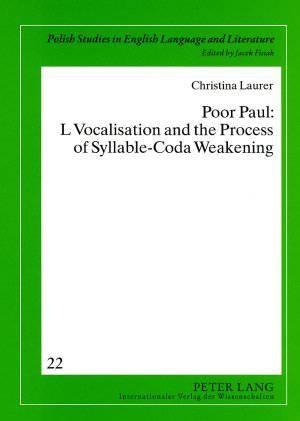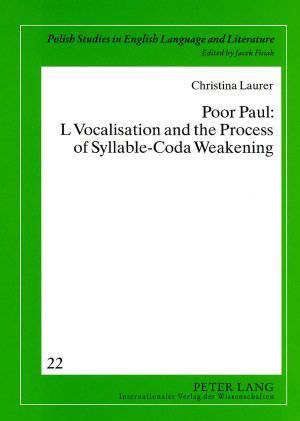
- Afhalen na 1 uur in een winkel met voorraad
- Gratis thuislevering in België vanaf € 30
- Ruim aanbod met 7 miljoen producten
- Afhalen na 1 uur in een winkel met voorraad
- Gratis thuislevering in België vanaf € 30
- Ruim aanbod met 7 miljoen producten
Zoeken
Poor Paul: L Vocalisation and the Process of Syllable-Coda Weakening
Christina Laurer
€ 61,95
+ 123 punten
Omschrijving
L Vocalisation (milk [miuk]) originated in London a century ago and contributes to the linguistic phenomenon of «Dialect Levelling». This study investigates L Vocalisation in the speech of the middle classes and reveals its widespread acceptance. The social factors Age and Gender are significant: young male adults are in the lead. L Vocalisation prevails in the speech of people in the South of England with regional links to urban areas. Back vowels encourage this process, whilst front vowels still hinder it. Thus, bulb is more likely to be pronounced as [bAub] than silk as [siuk]. Comparably, R Dropping began in the Early Modern English period, and has led to non-rhotic varieties of English. Since both /r/ and /l/ are weak consonants, their progressive weakening in the coda position is only to be expected.
Specificaties
Betrokkenen
- Auteur(s):
- Uitgeverij:
Inhoud
- Aantal bladzijden:
- 236
- Taal:
- Engels
- Reeks:
- Reeksnummer:
- nr. 22
Eigenschappen
- Productcode (EAN):
- 9783631569139
- Verschijningsdatum:
- 5/05/2008
- Uitvoering:
- Paperback
- Formaat:
- Trade paperback (VS)
- Afmetingen:
- 148 mm x 210 mm
- Gewicht:
- 319 g

Alleen bij Standaard Boekhandel
+ 123 punten op je klantenkaart van Standaard Boekhandel
Beoordelingen
We publiceren alleen reviews die voldoen aan de voorwaarden voor reviews. Bekijk onze voorwaarden voor reviews.











